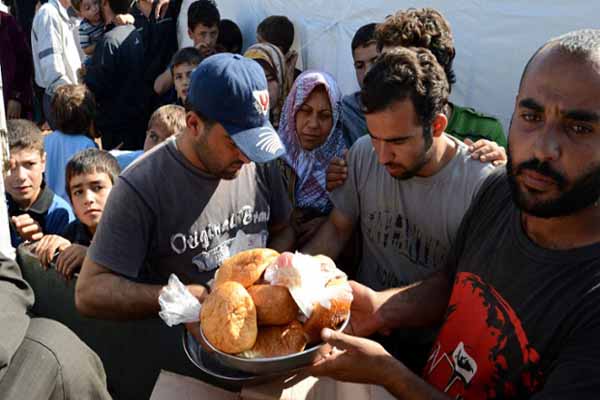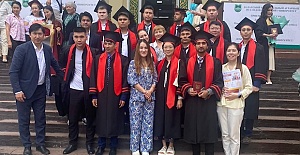The humanitarian situation in Syria is worsening rapidly with some areas a landscape of "devastation and destruction", the Red Cross said on Thursday after a month which activists said was the bloodiest yet in the conflict. About 70,000 people have been killed and millions displaced during the two-year-old uprising, the United Nations says. Civilians have been cut off from water, electricity and life-saving medical supplies, especially in rebel-held areas targeted by air strikes and ballistic missiles. The Syrian government's restrictions on aid convoys have meant most supplies are distributed in government-held areas.
Peter Maurer, president of the International Committee of the Red Cross (ICRC), said aid workers had been able to do make more trips into opposition-held areas in the past two weeks, indicating Damascus may be softening its stance on convoys into such territory.
He said the workers were "not pleasantly surprised" by what they found in areas accessible for the first time, with the need for food, sanitation, water and medicine increasing.
"We saw devastation and destruction," he said.
"What we were able to achieve is not enough. The needs are growing exponentially while our ability to react is growing linearly," he said.
Convoys and volunteers for the Syrian Arab Red Crescent - the ICRC's partner in Syria - have been targeted during the civil war by both sides, who are suspicious of the group's neutrality. Several volunteers have been jailed or killed.
Maurer called for aid groups to be respected. "When we have a convoy on the road from Damascus to any part of Syria it is of the uttermost importance that this convoy is allowed to pass checkpoints and is not shot at," he said at the end of a three-day visit to neighbouring Lebanon, which has 400,000 Syrian refugees.
The Syrian Observatory for Human Rights said on Monday that March was the bloodiest month yet in the conflict, with more than 6,000 people killed, a third of them civilians.
The group opposes Syrian President Bashar al-Assad but has monitored human rights violations on both sides.



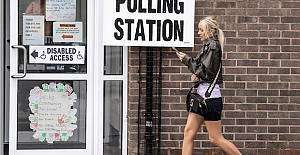 Advice for Enfield residents ahead of the General Election
Advice for Enfield residents ahead of the General Election Sunak promises tax cuts, economic stability, Conservative Party election manifesto
Sunak promises tax cuts, economic stability, Conservative Party election manifesto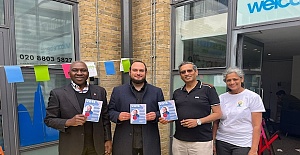 Ertan Karpazli, an independent MP candidate for the Enfield North constituency
Ertan Karpazli, an independent MP candidate for the Enfield North constituency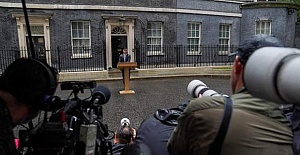 Rishi Sunak announces a general election in a statement outside Downing Street
Rishi Sunak announces a general election in a statement outside Downing Street Residents of Spanish island of Mallorca launch initiative to thank tourists amid protests over mass tourism
Residents of Spanish island of Mallorca launch initiative to thank tourists amid protests over mass tourism Srebrenica Remembered, Lessons for Justice and Peace! YEE London held a reflective event
Srebrenica Remembered, Lessons for Justice and Peace! YEE London held a reflective event British Premier Keir Starmer to reset UK-EU relations with high-profile meetings
British Premier Keir Starmer to reset UK-EU relations with high-profile meetings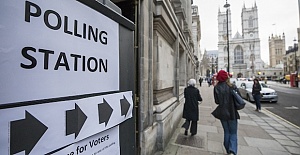 Voters head to polls for UK general election
Voters head to polls for UK general election The Swiss official will take charge of the match between Real Madrid and Atalanta in Warsaw
The Swiss official will take charge of the match between Real Madrid and Atalanta in Warsaw Applications are now open for Walking and Cycling Grants London until 9 September 2024
Applications are now open for Walking and Cycling Grants London until 9 September 2024  Two Circles also appointed as exclusive media sales agency for UEFA Women’s Champions League
Two Circles also appointed as exclusive media sales agency for UEFA Women’s Champions League  England manager Gareth Southgate has resigned two days after defeat by Spain
England manager Gareth Southgate has resigned two days after defeat by Spain Joyce and Snell's planning application gets stamp of approval
Joyce and Snell's planning application gets stamp of approval The amount of bounce back loans fully repaid is just %13
The amount of bounce back loans fully repaid is just %13 Petrol prices higher than they should be, says RAC
Petrol prices higher than they should be, says RAC UEFA and Mastercard renew UEFA Champions League partnership
UEFA and Mastercard renew UEFA Champions League partnership




